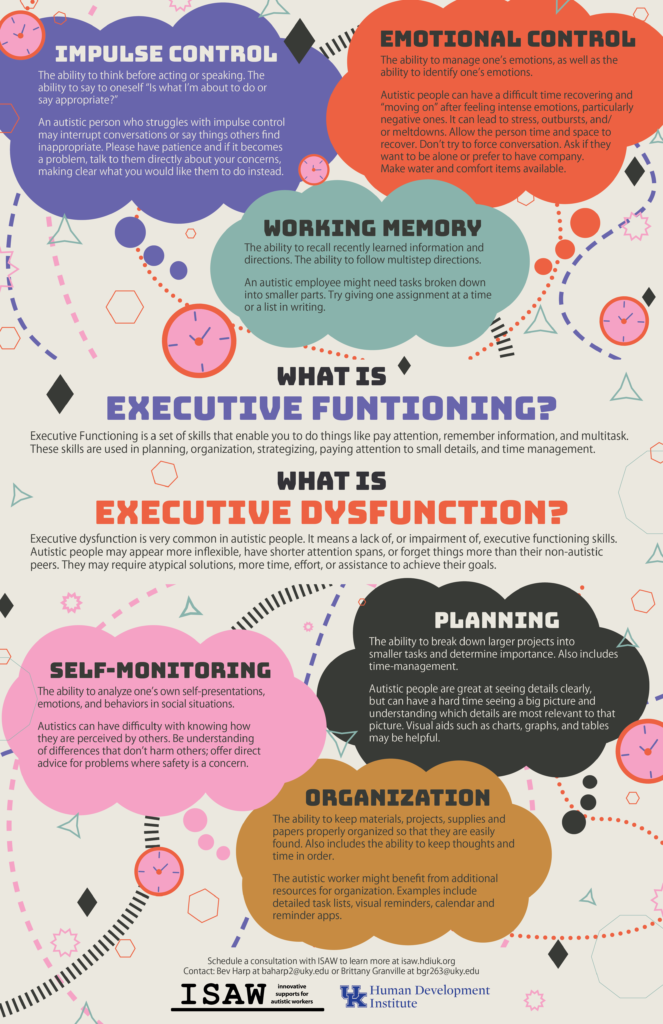
Plane text:
What is Executive Functioning?
Executive Functioning is a set of skills that enable you to do things like pay attention, remember information, and multitask. These skills are used in planning, organization, strategizing, paying attention to small details, and time management.
What is Executive Dysfunction?
Executive dysfunction is very common in autistic people. It means a lack of, or impairment of, executive functioning skills. Autistic people may appear more inflexible, have shorter attention spans, or forget things more than their non-autistic peers. They may require atypical solutions, more time, effort, or assistance to achieve their goals.
Impulse Control
The ability to think before acting or speaking. The ability to say to oneself “Is what I’m about to do or say appropriate?”
An autistic person who struggles with impulse control may interrupt conversations or say things others find inappropriate. Please have patience and if it becomes a problem, talk to them directly about your concerns, making clear what you would like them to do instead.
Working Memory
The ability to recall recently learned information and directions. The ability to follow multistep directions.
An autistic employee might need tasks broken down into smaller parts. Try giving one assignment at a time or a list in writing.
Emotional Control
The ability to manage one’s emotions, as well as the ability to identify one’s emotions.
Autistic people can have a difficult time recovering and “moving on” after feeling intense emotions, particularly negative ones. It can lead to stress, outbursts, and/or meltdowns. Allow the person time and space to recover. Don’t try to force conversation. Ask if they want to be alone or prefer to have company. Make water and comfort items available.
Self-Monitoring
The ability to analyze one’s own self-presentations, emotions, and behaviors in social situations.
Autistics can have difficulty with knowing how they are perceived by others. Be understanding of differences that don’t harm others; offer direct advice for problems where safety is a concern.
Organization
The ability to keep materials, projects, supplies and papers properly organized so that they are easily found. Also includes the ability to keep thoughts and time in order.
The autistic worker might benefit from additional resources for organization. Examples include detailed task lists, visual reminders, calendar and reminder apps.
Planning
The ability to break down larger projects into smaller tasks and determine importance. Also includes time-management.
Autistic people are great at seeing details clearly, but can have a hard time seeing a big picture and understanding which details are most relevant to that picture. Visual aids such as charts, graphs, and tables may be helpful.
Resources used:
Academic research
- 2015 American Academy of Neurology: https://www.ncbi.nlm.nih.gov/pmc/articles/PMC4455841/
- Acute Physical Activity Enhances Executive Functions in Children with ADHD by Scientific Reports 2018: https://www.nature.com/articles/s41598-018-30067-8
Online Articles on executive functioning/dysfunctioning:
- Harvard University: https://developingchild.harvard.edu/science/key-concepts/executive-function/
- Healthline: https://www.healthline.com/health/executive-dysfunction#diagnosis
- “Girls on the spectrum may have problems with planning”: https://www.spectrumnews.org/news/girls-spectrum-may-problems-planning/?fbclid=IwAR1RQlFak6FTuHGDBnOXymk3654ULB8O6xJVSQfEIyGnk1fsbIvWbW4Hwoc
- Brain Region Responsible for Executive Functioning Also Moderates Pain Perception: https://www.technologynetworks.com/diagnostics/news/brain-regions-governing-the-complex-relationship-between-mood-and-pain-319672?fbclid=IwAR2U_ycmCnmFQ6BjxLqUYIbGsW-Bxh66r0SwmmivhekeQMb-C65COfr_KnU
- ADDitude: “What Does Executive Function Disorder Look Like in Adults?”: https://www.additudemag.com/executive-function-disorder-in-adults-symptoms/
- How Is Executive Functioning Affected by Autism? https://www.joinsprouttherapy.com/studio/autism/executive-functioning
- https://www.understood.org/articles/en/what-is-executive-function
Online Articles by self-advocates
- 3 Symptoms of Executive Dysfunction – And How Not Recognizing Them Might Result in Ableism: https://everydayfeminism.com/2015/09/symptoms-executive-dysfunction/
- Academic Anxiety: How Perfectionism and Executive Dysfunction Collide: https://www.beyondbooksmart.com/executive-functioning-strategies-blog/academic-anxiety-how-perfectionism-and-executive-dysfunction-collide
Online articles with tips
- Top 10 Frightfully Useful Tips from Executive Function Coaches: https://www.beyondbooksmart.com/executive-functioning-strategies-blog/adhd-awareness-month-top-10-tips-from-executive-function-coaches
- “Lazy Kid or Executive Dysfunction?”: http://www.ldonline.org/article/6311/
Educational videos on Executive Functioning
- Executive Functioning: The Brain’s Control Center: https://www.youtube.com/watch?v=sZmElSGKBG8
- Ask an Autistic #25 – What is Executive Functioning?: https://www.youtube.com/watch?v=229Xb50_o8M&t=573s
Videos by self advocates:
- ADHD & Executive Dysfunction: https://www.youtube.com/watch?v=ZZcauWnQcrc
- Managing executive dysfunction: https://www.youtube.com/watch?v=Y4QOo7tL7kc
Videos on ways to manage
- “Cutting Edge Strategies to Improve Executive Functioning Skills: An Interview with Sarah Ward”: https://www.youtube.com/watch?v=EfQ2W1KaKeg
